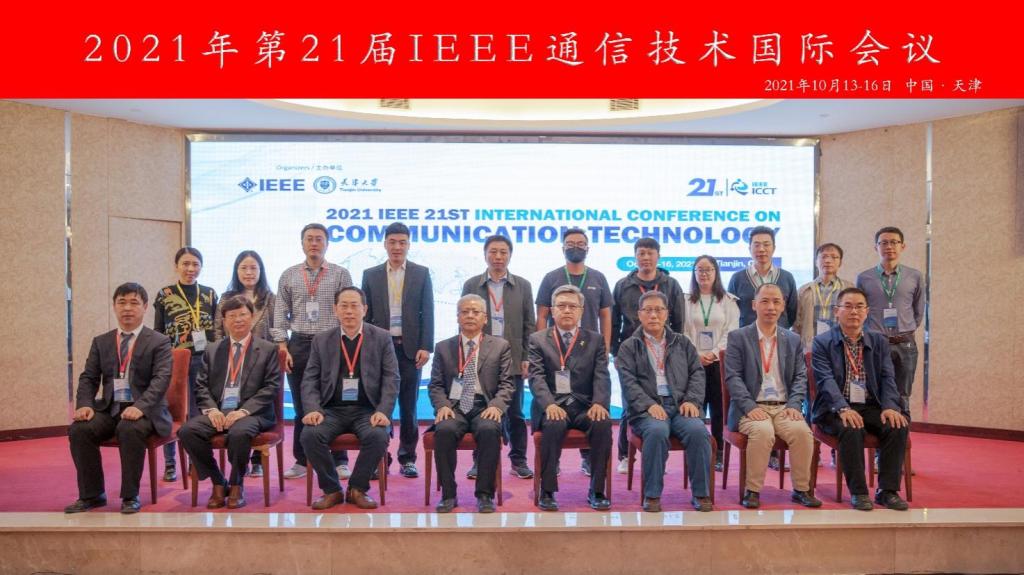On October 13 to 16 , the 2021 IEEE’s 21st International Conference on Communication Technology was held at Tianjin University, by the School of Electrical and Information Engineering. It was co-organized by the University of Electronic Science and Technology of China (UESTC), and Science and Technology on Communication Networks Laboratory, and sponsored by Xidian University, Beijing University of Posts and Telecommunications, Guangxi University, Chongqing University, the Science and Technology on Communication Information Security Control Laboratory, and the Communication Society of Chinese Institute of Electronics.

Due to the impact of COVID-19, the conference was held in both online and offline formats, attracting extensive attention from scholars at home and abroad. More than 100 experts and scholars attended the conference on-site, and over 200 experts and scholars participated in the conference online.
The International Conference on Communication Technology (ICCT) was jointly initiated by the China Institute of Communications and the Chinese Institute of Electronics in 1986. The conference covers all aspects of the field of communication technology. It is one of the highest level academic activities in the field of communication technology in China, and also an international grand event for communication technology research. Since its inception in 1986, the conference has been held for 20 sessions. It focuses on the new theories and applications of communication technology, and provides a platform for experts and scholars in the field of communication technology and related research to exchange the latest research results and the direction of academic development.
The Conference opened at 9am on October 14. Professor Gong Ke, president of the World Federation of Engineering Organizations, chairman of the Academic Committee of Nankai University, and executive director of Chinese Institute for New Generation Artificial Intelligence Development Strategies, and Mr. Bi Junsheng, director of Tianjin Institute of Communications attended the conference and addressed welcome messages. Professor Hu Wenping, managing vice president of Tianjin University, and Professor Wang Chengshan, dean of the School of Electrical and Information Engineering of Tianjin University, attended the conference and delivered opening speeches.
The guests reviewed the history of the ICCT, looked forward to the development of the communication technology industry, and expressed heartfelt wishes for the convening of the conference and gratitude to all units of the conference for their assistance. They also encouraged the participants to communicate extensively during this meeting. Professor Gu Huaxi, deputy dean of the School of Communication Engineering of Xidian University, introduced the organization of the conference, the submission of papers, and the presentation of guests on behalf of the Conference Program Committee.
The conference invited 8 well-known experts at home and abroad to give keynote speeches, including Professor H. Vincent Poor (IEEE Fellow) of Princeton University, Professor Feng Zhiyong of Beijing University of Posts and Telecommunications, Associate Professor Gao Feifei of Tsinghua University (IEEE Fellow), Germany Professor Robert Schober of Friedrich-Alexander Erlangen-Nuremberg University, Professor Muriel Médard of Massachusetts Institute of Technology (IEEE Fellow), Professor Liang Yingchang of the University of Electronic Science and Technology of China (IEEE Fellow), Professor Chao Lu from Hong Kong Polytechnic University (OSA Fellow) and Professor Zhiguo Ding (IEEE Fellow) from the University of Manchester.
All the submitted papers were strictly reviewed by the Program Committee. The conference received a total of nearly 600 papers from all over the world. After delicate selection, 283 papers were accepted and published on the 2021 ICCT proceedings by IEEE. The papers were also included in IEEE Xplore online database, and were later retrieved by IEEE Xplore and SCOPUS.
The conference consisted of 31 sub-sessions, including the Special Session, Workshops, on-site oral presentation, poster presentation and online oral presentation. The participants held heated discussions on various topics, including communication theory and technology, network resource allocation and management, signal modulation and coding, and communication and information system, ect.
By Liu Yani
Editor: Dai Chenming & Eva Yin